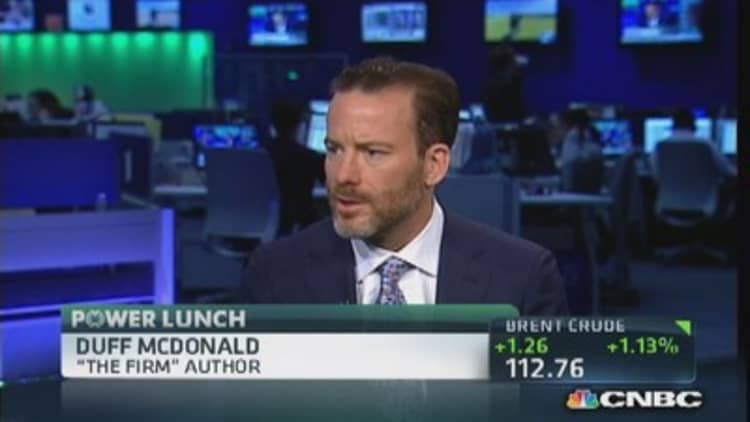
To outsiders, McKinsey & Co. is a simply a consulting firm, but for many of the biggest hitters in corporate America, it is an indispensable tool: where executives turn for advice and where boards go when they need a CEO.
In the new book "The Firm," Duff McDonald takes a rare look inside the secretive world of McKinsey.
McKinsey's main function is as a management consultant, helping with corner office decisions and corporate strategy. The firm generates more than $7 billion in revenue annually, which is far smaller than many of the companies it advises. It doesn't come in and execute, it doesn't manage and it takes no credit—but it also takes no blame.
For its employees, McKinsey offers a ticket to almost anywhere in the world and a launching pad for high-profile corporate jobs Recently, a tally of Fortune 500 CEOs found that more than 70 were McKinsey alumni.
There are approximately 27,000 McKinsey alums spanning 120 nations in virtually every business sector. In recent years, 150 McKinsey alums had a top spot at companies with more than $1 billion in annual sales. According to USA Today, the odds of a McKinsey consultant becoming a CEO were the best the world, at 1 in 690.
The McKinsey advantage, according to McDonald, varies. Throughout the book, he describes the firm in numerous ways:
- "Expensive, intelligent sounding board for the executives"
- "Industrial espionage couched in the language of best practices"
- "Managerial experts"
- "Cost cutters"
- "Scapegoats"
- "Catalyst for corporate change"
- "Corporate mandarin elite"
- "Powerful talisman"
- "Corporate shrink for the insecure CEO"
But who does McKinsey serve in the digital age? As it turns out, the Googles and Apples of the world have shown little interest in engaging the firm—perhaps because they are more focused on winning in the short term, which has never been McKinsey's strength. The firm's signature clients remain old school: American Express, AT&T, Citibank and General Motors, to name a few.
McKinsey also dominated the MBA era of the late 1980s and early 1990s, but today, elite graduates tend to flock to smaller, more nimble companies. Facebook's Sheryl Sandberg and Google's Patrick Pichette are among the most highflying McKinsey alums in Silicon Valley.
Is the McKinsey talent pool draining?
McDonald says the firm is at risk of becoming a "pit stop for talent," a place that trains people for more exciting careers elsewhere. He says that only 1 in 6 new hires remain at the firm for more than five years.
So, what is McKinsey's greatest challenge right now? McDonald suggests the firm's biggest test is managing its own stupendous success. It is now a commercial conglomerate and some believe it is in danger of becoming too large to manage effectively, or maintain the elite level of service that it provides to clients.
McKinsey's main focus for new business is Asia, because in the new economy companies need different kinds of services. Since its job as advisors and consultants is to help clients navigate cross-cultural bureaucracy, China is a great place to be, as it is a nation known for red tape.
In McKinsey's defense, McDonald says that the firm is only the advisor, not decision-maker—and you can always find a client in need of advice—and that's helped the firm grow globally, despite the unique challenges of the new economy.
—By CNBC's Kerima Greene.

